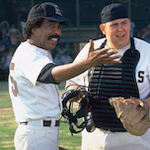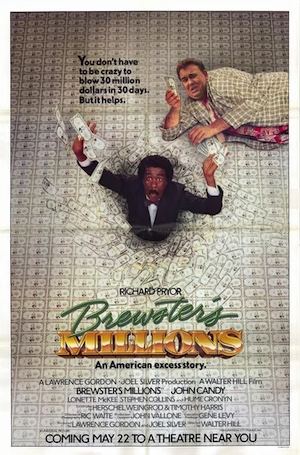 May 22, 1985
May 22, 1985
On the same Wednesday that RAMBO: FIRST BLOOD PART II was released, Walter Hill followed up HARD TIMES, THE DRIVER, THE WARRIORS, THE LONG RIDERS, SOUTHERN COMFORT, 48 HRS. and STREETS OF FIRE with a new movie produced by Lawrence Gordon (ROLLING THUNDER, PREDATOR, DIE HARD) and Joel Silver (COMMANDO, LETHAL WEAPON, ROAD HOUSE) and starring the great Richard Pryor (THE MACK, HIT!). But it was a pretty dumb PG-rated comedy that doesn’t really take full advantage of either of their skills, other than Pryor’s general likability.
 Pryor plays Monty Brewster, pitcher for the minor league baseball team the Hackensack Bulls. He and his best friend/catcher Spike Nolan (John Candy, THE SILENT PARTNER) try to be big fish in a small pond, hitting on baseball groupies at a bar after the game, but even there they’re medium-sized, overshadowed by a manlier player from the away team (Grand L. Bush, DIE HARD, LICENCE TO KILL, STREET FIGHTER). Which leads to a bar brawl, the most Walter Hill part of the movie.
Pryor plays Monty Brewster, pitcher for the minor league baseball team the Hackensack Bulls. He and his best friend/catcher Spike Nolan (John Candy, THE SILENT PARTNER) try to be big fish in a small pond, hitting on baseball groupies at a bar after the game, but even there they’re medium-sized, overshadowed by a manlier player from the away team (Grand L. Bush, DIE HARD, LICENCE TO KILL, STREET FIGHTER). Which leads to a bar brawl, the most Walter Hill part of the movie.
Monty and Spike get arrested and bailed out by the mysteriouis J.B. (Joe Grifasi, MONEY TRAIN), who Monty believes is a major league scout, but he’s actually a private investigator hired to bring Monty to a law office in New York City to learn about an inheritance from his previously unknown self-declared honkie uncle Rupert Horn (Hume Cronyn, THE POSTMAN ALWAYS RINGS TWICE). It’s $300 million, but his uncle is one of these freaks we know about from movies who insist on using their last will and testament as some kind of weird bet, prank or performance art project.
 Alot of guys just have to sign a bunch of documents and/or spend the night in a haunted house. But apparently as some kind of lesson about money not being fun, Monty has to take $30 million in cash and in 30 days have none of it left, but also no assets, and there’s lots of Dogme 95 style restrictions like he can only donate 5% to charity and he can’t, like, buy a painting and burn it. Also, he can’t tell anybody why he’s spending all his money, including Spike or even Angela (Lonette McKee, THE COTTON CLUB, ‘ROUND MIDNIGHT, HE GOT GAME), the paralegal assigned to keep receipts of his spending.
Alot of guys just have to sign a bunch of documents and/or spend the night in a haunted house. But apparently as some kind of lesson about money not being fun, Monty has to take $30 million in cash and in 30 days have none of it left, but also no assets, and there’s lots of Dogme 95 style restrictions like he can only donate 5% to charity and he can’t, like, buy a painting and burn it. Also, he can’t tell anybody why he’s spending all his money, including Spike or even Angela (Lonette McKee, THE COTTON CLUB, ‘ROUND MIDNIGHT, HE GOT GAME), the paralegal assigned to keep receipts of his spending.
His main trick is just to hire people, and pay them exorbitantly. He hires J.B. as his personal photographer, the guards at the bank as his security team, the first cabbie he sees as one of many drivers. In screwball comedy and/or David O. Russell tradition he quickly builds an entourage so that there are multiple scenes where a ridiculously large group follows him around everywhere he goes.
The joke about “what kind of crazy stuff could you do in this situation?” is amusing enough for a while, but doesn’t lead to any strong insights about, like, capitalism in the Reagan era or anything like that. I really didn’t like the thread about running for mayor. Not just because we’re living in a dystopic future caused by wacky rich people running for office just because they can afford it, but because of the shallowness of trying to pass “throw the bums out” as genuine political commentary. Either do better with the serious part or be funny. You can’t do neither.
I liked McKee as the straight-woman, though as in so many movies you gotta wonder why she would put up with this guy, especially during the parts where she doesn’t know why he’s acting so crazy. As soon as you see Angela’s glasses you know she’s gonna take those off and be the love interest. That’s despite being engaged to Warren Cox (Stephen Collins, STAR TREK: THE MOTION PICTURE), an investment banker who she talks up as “involved with the Sierra Club, the anti-nuclear movement, UNICEF, and he’s a sincere feminist.”
One semi-unpredictable touch I kinda like is that Warren doesn’t turn out to be a total asshole or phony. Monty tries to mess with him by paying him more than his normal salary to do interior decoration, but he throws himself into the job passionately. And I was relieved that this didn’t lead to a twist about him being closeted.
A couple bits that made me chuckle: the uncle made a film explaining the conditions of his will, speaking directly to Monty, and somehow anticipating the questions he would ask and responding to them at the proper time. Rick Moranis has a cameo as a supposed master of mimicry who just follows people around repeating what they say. Spike gets into flashy suits and buys a gold chain with a huge catcher mitt medallion like Ghostface might wear if he was a catcher.
As in many of Hill’s films, the score is by Ry Cooder, with some pretty good bluesy parts, but also some sort of jaunty upbeat parts that play to the modern ear as “cheesy,” which to be fair is appropriate for the material. The most specific evidence of when it was filmed is that the Statue of Liberty has scaffolding around it for restoration. (Not visible on screen: they had to be done filming in L.A. before the Olympics started.) But if I had to choose the most dated aspect, it would be that Yakov Smirnof plays the cab driver, and says “What a country!” I think that’s the only connection to the Cold War/communism themes of GOTCHA!, GYMKATA and RAMBO: FIRST BLOOD PART II.
Watch for Lin Shaye in a bit part as a reporter. This was her movie between A NIGHTMARE ON ELM STREET and CRITTERS.
The story originates from a 1902 book by George Barr McCutcheon, who’s actually had more than 30 movies based on his books, but most of those were silents, and 13 were based on this one book (including MISS BREWSTER’S MILLIONS, the GHOSTBUSTERS 2016 of 1926). For this one it’s adapted by Timothy Harris & Herschel Weingrod, who had just done the more beloved rich-guys-doing-weird-bets comedy TRADING PLACES and would go on to write TWINS, KINDERGARTEN COP and SPACE JAM. As one does.
They wrote the script thinking it would be good for Bill Murray, but for a while it was developed for John Ritter, to be directed by Peter Bogdanovich. Hill, meanwhile, was trying to make a Dick Tracy movie, having taken over for John Landis (TRADING PLACES) after the TWILIGHT ZONE tragedy. Hill got Warren Beatty on board and started building sets, but envisioned a violent, realistic gangster movie. And we know from the futuristic year of 1990 that Beatty had something very different in his head. So both of them left the project, and Hill took on the only straight-ahead comedy of his career, later admitting it was kind of a paycheck/career move type of job.
That wasn’t, as you might think, in response to STREETS OF FIRE not doing well – this had already been in the works. According to the John Candy biography Laughing on the Outside, Candy visited Hill during the filming of STREETS. Hill was surprised Candy wanted the role, and promised to find more for his character to do.
Pryor was reportedly sober, struggling with the belief that he couldn’t be funny without drugs. But Hill later told The Hollywood Reporter, “Richard really liked the film and he specifically liked being a comedic actor rather than a full-blast comedian in it. Over the years, he told me several times BREWSTER’S was his favorite.”
The two didn’t do any more films together, but when Pryor died in 2005, Hill was set to direct a biopic based on the comedian’s 1995 autobiography, Pryor Convictions, with Mike Epps starring. It’s one of many Pryor biopics that have never gotten off the ground – luckily, Pryor himself directed and starred in the semi-autobiographical JOJO DANCER, YOUR LIFE IS CALLING in 1986.
BREWSTER’S MILLIONS couldn’t really compete with the action-packed movies coming out the same week, but it ultimately made about $45 million on a $20 million budget, so it did okay. Weird though that the entire budget of the movie was only two-thirds of what the character spent in a month. And how many people were employed on that? Did they feel they weren’t being paid enough?



























May 26th, 2020 at 11:47 am
Always quite enjoyed this in a Sunday-afternoon kind of way. Can only really remember the “None of the Above!” press conference scene though